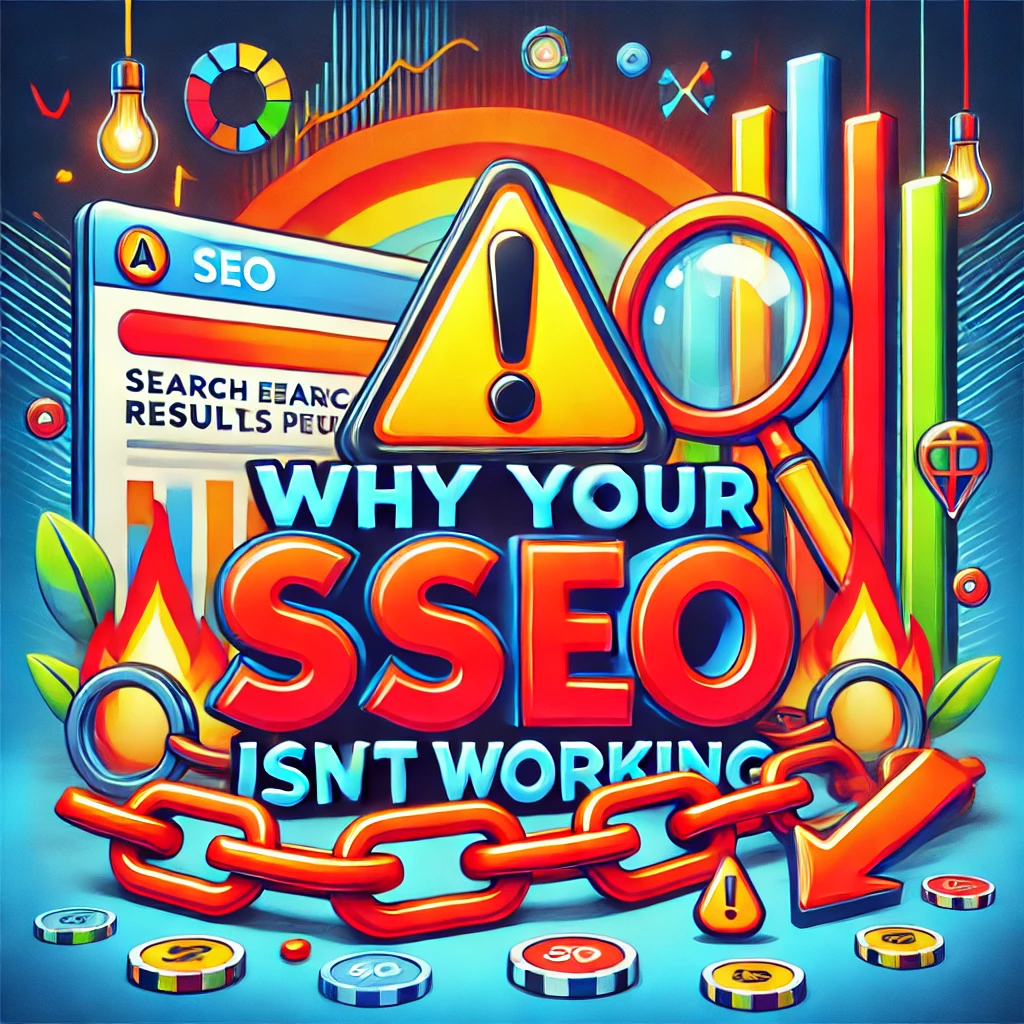Search Engine Optimization (SEO) is an essential component of digital marketing, yet many businesses struggle to see results despite their efforts. If you’re putting time and resources into SEO but still not seeing the desired improvement in search rankings, traffic, or conversions, you’re not alone. The world of SEO is complex and constantly evolving. Understanding why your SEO strategy might not be working can save you time and prevent frustration.
In this article, we’ll dive into the most common reasons why SEO efforts fail and how to fix them.
1. Not Understanding SEO Fundamentals
Many businesses jump into SEO without truly understanding the fundamentals, leading to half-baked strategies that don’t drive results. SEO is not just about adding keywords to your website; it involves on-page optimization, technical SEO, off-page SEO, and content strategies.
Common Mistakes:
- Keyword stuffing: Trying to rank by excessively repeating keywords without focusing on quality content.
- Ignoring technical SEO: Slow page load speeds, broken links, and improper indexing can cripple your SEO efforts.
- Neglecting user experience: If your site isn’t mobile-friendly or doesn’t offer a smooth user journey, Google will penalize it.
Solution:
Learn the core aspects of SEO, including how search engines work, the importance of high-quality content, and the role of user experience. A comprehensive approach that considers both technical and non-technical aspects is crucial for success.
2. Targeting the Wrong Keywords
Keyword research is one of the most important aspects of an SEO strategy. If you’re targeting overly competitive keywords or ones that don’t match user intent, you’re unlikely to rank well or attract meaningful traffic.
Common Mistakes:
- Broad or highly competitive keywords: Focusing on broad terms like “shoes” instead of more targeted keywords like “best running shoes for men.”
- Ignoring user intent: Selecting keywords without considering what users are actually searching for or what problems they’re trying to solve.
Solution:
Use tools like Google Keyword Planner, Ahrefs, or SEMrush to identify relevant, low-competition keywords with high search volume. Long-tail keywords, which are more specific and less competitive, are often easier to rank for and bring in more targeted traffic.
3. Lack of Quality Content
High-quality, valuable content is the backbone of any successful SEO strategy. If your content is thin, irrelevant, or unengaging, it’s unlikely to attract links, rank well, or satisfy user intent.
Common Mistakes:
- Low-quality or plagiarized content: Publishing content that’s copied or lacks originality will not help you rank.
- Not solving user problems: Creating content that doesn’t address the pain points of your target audience.
- Short content: Google tends to favor longer, more in-depth articles that comprehensively cover a topic.
Solution:
Focus on creating high-quality, original content that provides value to your audience. Understand your target audience’s needs, problems, and search intent. Long-form content (1,500 words or more) is often more effective in ranking for competitive keywords, as it provides comprehensive solutions to users’ queries.
4. Overlooking Technical SEO
Technical SEO refers to optimizing your website for search engine crawlers, which directly impacts your rankings. If your site has technical issues, even great content won’t rank well.
Common Mistakes:
- Slow page load times: Google considers page speed as a ranking factor, and slow websites can negatively impact user experience.
- Broken links and redirects: Too many broken links or poorly configured redirects can confuse search engines and visitors.
- No XML sitemap: If Google can’t crawl your site effectively, your pages may not get indexed.
Solution:
Conduct a thorough technical SEO audit using tools like Screaming Frog, Google Search Console, and GTmetrix. Focus on improving your site speed, fixing broken links, optimizing for mobile, and ensuring your site is easily crawlable with a proper sitemap and robots.txt file.
5. Ignoring Mobile Optimization
With the rise of mobile usage, Google has adopted mobile-first indexing, meaning it primarily uses the mobile version of your website for indexing and ranking. If your site isn’t mobile-friendly, it can seriously harm your SEO.
Common Mistakes:
- Unresponsive design: A website that doesn’t adapt well to different screen sizes or mobile devices.
- Slow mobile loading times: Mobile users expect fast performance, and delays can lead to high bounce rates.
Solution:
Ensure that your website is fully responsive and mobile-optimized. Use Google’s Mobile-Friendly Test to check how your site performs on mobile devices and optimize loading times with techniques like image compression and lazy loading.
6. Neglecting Off-Page SEO and Backlinks
Off-page SEO, particularly building quality backlinks, remains a significant factor in determining a site’s ranking. If you’re not focusing on building relationships and earning backlinks, your SEO efforts are incomplete.
Common Mistakes:
- Buying or spamming backlinks: Low-quality, irrelevant, or spammy backlinks can lead to Google penalties.
- Lack of outreach: Not engaging in backlink-building activities such as guest posting or influencer outreach.
Solution:
Focus on building natural, high-quality backlinks from authoritative websites in your niche. Guest blogging, influencer marketing, and creating shareable content (like infographics or comprehensive guides) are great ways to earn backlinks.
7. Not Tracking and Measuring SEO Performance
If you’re not regularly monitoring your SEO performance, you’ll have no way of knowing if your efforts are working or where improvements are needed.
Common Mistakes:
- Not using Google Analytics or Search Console: These free tools provide crucial data on your site’s performance and how visitors are interacting with your content.
- Failing to set KPIs: Without key performance indicators (KPIs), it’s hard to measure success or failure.
Solution:
Use Google Analytics, Search Console, and SEO tools like Ahrefs or SEMrush to monitor your rankings, organic traffic, bounce rates, and conversion rates. Set clear KPIs (e.g., organic traffic, ranking positions, or conversions) to measure progress and adjust your strategy accordingly.
8. Expecting Immediate Results
SEO is a long-term game, and one of the biggest mistakes beginners make is expecting overnight success. SEO takes time, especially if you’re in a competitive industry or niche.
Common Mistakes:
- Giving up too soon: Quitting SEO efforts because of impatience or unrealistic expectations.
- Changing strategies too often: Constantly shifting strategies without giving your efforts time to produce results.
Solution:
Be patient and consistent. SEO typically takes several months to show significant results. Keep working on producing valuable content, building backlinks, and improving your website’s performance over time.
9. Not Optimizing for Local SEO
If you’re a local business and you’re not optimizing for local SEO, you’re missing out on a huge opportunity to attract local customers.
Common Mistakes:
- Ignoring Google My Business: Not claiming or optimizing your Google My Business listing can hinder your local search rankings.
- Not using local keywords: Failing to include location-based keywords can limit your visibility in local search results.
Solution:
Optimize your Google My Business profile, encourage customer reviews, and use local keywords to improve your local search rankings.
Conclusion
SEO is a multi-faceted discipline, and failing to address even one aspect can cause your efforts to underperform. Whether it’s choosing the wrong keywords, neglecting technical SEO, or not focusing on quality content, understanding the reasons why your SEO isn’t working is the first step toward improving your strategy.
By fixing these common mistakes, monitoring your progress, and staying patient, you can turn around a failing SEO campaign and start seeing better results in search engine rankings, organic traffic, and conversions.


